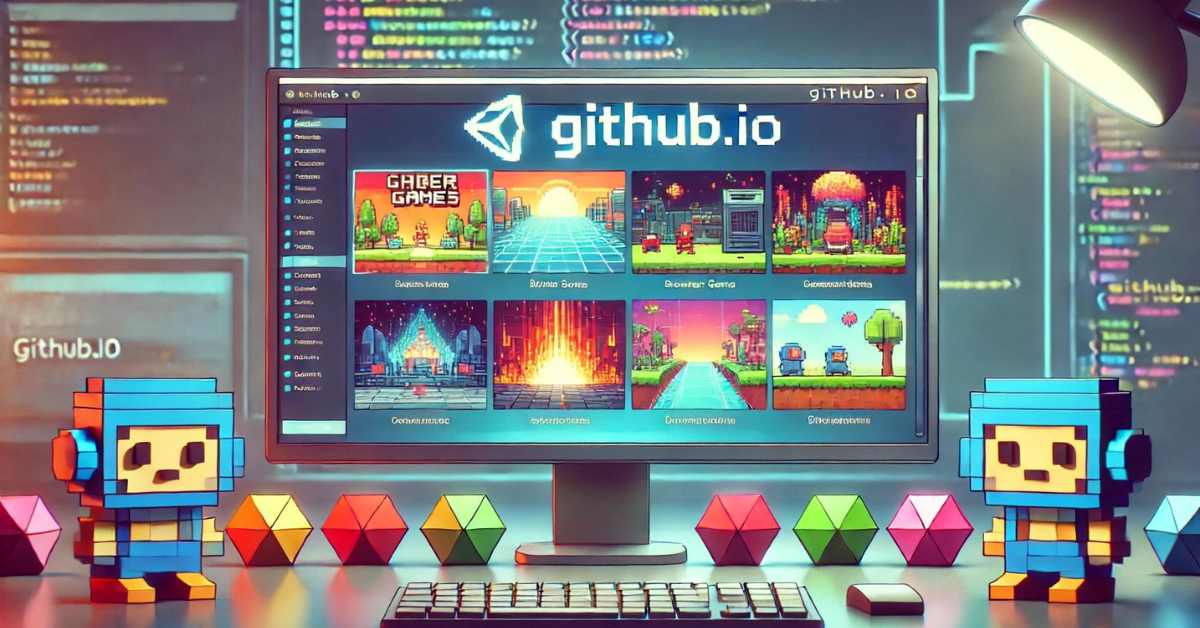Introduction
GitHub.io games have gained popularity among both developers and casual gamers. Ranging from simple browser-based games to intricate multiplayer platforms, the collection of games hosted on GitHub.io is extensive and varied. But what exactly are GitHub.io games, and why have they become a favored platform for indie game developers?
In this article, we will dive deep into the world of GitHub.io games, exploring what they are, how to access them, the benefits for players and developers, and some of the best games available. If you’re looking for fun, innovation, and the intersection of gaming and coding, you’ve come to the right place.
What are GitHub.io Games?
GitHub.io games are web-based games hosted on GitHub Pages, a free hosting service provided by GitHub. Developers use GitHub to share their code, projects, and ideas with others. With GitHub Pages, they can also showcase live projects, including interactive browser games.
These games are often developed using HTML, CSS, and JavaScript, making them lightweight, fast, and easy to access directly from a browser. GitHub.io games are open-source, allowing players and developers to explore the game’s code, contribute to development, or even customize the gameplay.
Key Features of GitHub.io Games
- Open-source: Many of these games are freely available for everyone to view and modify.
- Browser-based: No downloads required, just click and play.
- Lightweight: They often run smoothly on most devices without heavy resource consumption.
- Developer-friendly: They offer a platform for developers to showcase their projects, test ideas, and receive feedback from the community.
How to Find and Play GitHub.io Games
The beauty of GitHub.io games lies in their accessibility. There are various ways to find and play these games, whether you’re browsing repositories on GitHub or following recommendations from fellow developers.
Exploring GitHub Repositories for Games
If you want to dive into the vast collection of GitHub.io games, GitHub itself is a great place to start. Here’s how:
- Search GitHub: You can start by searching for game repositories using keywords like “game,” “HTML5 game,” or “GitHub.io games.”
- Explore Game Categories: Many games are tagged with relevant categories such as puzzle games, platformers, or arcade games.
- Use Trending Lists: Explore GitHub’s “Trending” section to find the most popular repositories, including games that are gaining attention from the community.
Playing Directly from GitHub.io Links
nce you’ve found a game that piques your interest, playing it is as simple as clicking the provided GitHub.io link. The game will open directly in your browser, and you’re good to go. Some repositories may also provide installation instructions if the game supports more complex features.
Read Next: Snow Rider Unblocked: A Comprehensive Guide to the Ultimate Online Gaming Experience
Why GitHub.io Games Are Popular
GitHub.io games have steadily gained popularity among developers and gamers for several reasons. Here are a few key benefits that contribute to their rising appeal:
1. Free and Accessible
One of the primary advantages of GitHub.io games is that they are completely free to play. Most developers host their games as a passion project or to showcase their work, making the games freely available to anyone with an internet connection.
2. Learning Platform for Developers
GitHub is known for being a valuable resource for developers. Hosting a game on GitHub.io allows developers to not only share their work but also receive feedback, collaborate with others, and improve their coding skills. New developers can learn by studying the code of existing games and participating in the community.
3. Customization and Contribution
Since many GitHub.io games are open-source, players who are familiar with coding can modify the game’s source code. Whether it’s creating new levels, adding features, or fixing bugs, anyone can contribute to improving or customizing the gameplay.
4. Minimal System Requirements
These games are designed to be lightweight, requiring minimal resources to run. This makes them accessible to users on older hardware or devices that might not support high-end gaming.
5. Creative Freedom
For developers, GitHub.io games provide a platform to experiment with new game mechanics, genres, and styles without the constraints of commercial gaming requirements. The indie nature of these games fosters creativity and innovation.
Best GitHub.io Games to Try in 2024
With thousands of GitHub.io games available, it can be overwhelming to find the best ones to play. Below are some standout games that have garnered attention for their creativity, fun factor, and technical execution.
1. 2048 (by Gabriele Cirulli)
One of the most popular GitHub.io games is 2048, a sliding tile puzzle game that challenges players to combine numbered tiles to reach the magic number: 2048. The game is simple, yet highly addictive, and has been forked by countless developers to introduce new gameplay elements and variations.
- Genre: Puzzle
- Technologies: JavaScript, HTML5
- Gameplay: Combine tiles to reach the number 2048.
2. Hextris (by Hextris developers)
Inspired by the classic game Tetris, Hextris introduces a new twist to the gameplay. Instead of controlling falling blocks, players rotate a hexagonal grid to match colors and clear tiles. Its minimalist design and fast-paced gameplay make it a standout among browser games.
- Genre: Puzzle, Arcade
- Technologies: HTML5, CSS, JavaScript
- Gameplay: Rotate hexagons to match and clear colored tiles.
3. Dino Game Remake (by Various Developers)
The famous Google Chrome Dino game, which appears when you’re offline, has been recreated numerous times on GitHub.io with different twists and additions. From adding multiplayer functionality to incorporating new obstacles, this simple running game has taken on a life of its own.
- Genre: Arcade
- Technologies: JavaScript, HTML5
- Gameplay: Avoid obstacles as a running dinosaur.
4. Astray (by Rye Terrell)
Astray is a first-person 3D puzzle game built with WebGL and Three.js. Players explore eerie environments, solve puzzles, and uncover the mysteries of a haunted facility. It showcases the power of modern web technologies for delivering high-quality gaming experiences.
- Genre: Puzzle, Adventure
- Technologies: WebGL, Three.js, HTML5
- Gameplay: Explore environments and solve puzzles.
How to Create Your Own GitHub.io Game
If you’re a developer looking to create your own game and host it on GitHub.io, the process is straightforward. You don’t need any special tools or software beyond your favorite code editor and some basic web development knowledge.
Consumed by Rage Weak Aura in World of Warcraft: Mastering Rage Management
Step 1: Plan Your Game Concept
Start by deciding on the type of game you want to build. Will it be a puzzle game? A platformer? Consider your technical abilities and what you hope to achieve.
Step 2: Write Your Game’s Code
The core of any GitHub.io game will typically consist of HTML, CSS, and JavaScript. Some games may also use libraries like Phaser.js, Three.js, or P5.js to simplify game development and add advanced features like physics, 3D rendering, and sound.
Step 3: Host on GitHub Pages
Once your game is coded, you can easily host it on GitHub Pages:
- Create a GitHub Repository: Start by creating a repository for your game.
- Upload Your Files: Include all the necessary files (HTML, CSS, JavaScript) in your repository.
- Enable GitHub Pages: In the repository settings, enable GitHub Pages and select the branch where your game files are located.
Step 4: Share and Collaborate
Once your game is live on GitHub.io, share the link with others, gather feedback, and even invite others to contribute to the project.
Advantages of Using GitHub Pages for Game Development
GitHub Pages is more than just a hosting platform—it offers unique advantages for game developers:
1. Free Hosting
GitHub Pages allows developers to host static sites for free, making it an ideal platform for lightweight web games.
2. Version Control
GitHub’s version control features allow developers to track changes in their codebase, making it easy to roll back to previous versions or collaborate with others.
3. Collaboration Opportunities
With GitHub, developers can open their game projects to contributions from the community. Players and fellow developers can report issues, suggest improvements, or contribute new features.
4. Customization and Forking
Developers can “fork” other games, modifying existing projects to create new experiences or even improving upon the original game’s mechanics.
Challenges in Developing GitHub.io Games
While there are many benefits to hosting games on GitHub.io, there are also some challenges to consider:
1. Limited Performance
Since GitHub Pages is designed for static websites, resource-intensive games may struggle to run smoothly. High-performance games may need alternative hosting solutions or optimizations.
2. Limited Backend Support
GitHub Pages only supports static content, which means games that require backend processing (e.g., for multiplayer features) may need to rely on external servers or APIs.
3. Web Browser Limitations
Browser-based games are subject to the limitations of the web environment, such as performance constraints, browser compatibility, and security issues.
Conclusion: The Future of GitHub.io Games
GitHub.io games are a fantastic way for developers to experiment, share their work, and engage with the gaming community. With their open-source nature and ease of access, they have become a breeding ground for innovation and creativity.
For players, GitHub.io games offer a treasure trove of unique and often free-to-play experiences that are just a click away. As web technologies continue to evolve, the future of GitHub.io games looks bright, with new possibilities for immersive and interactive browser-based gaming.
Whether you’re a developer looking to showcase your latest project or a gamer seeking your next favorite title, GitHub.io games have something for everyone.









